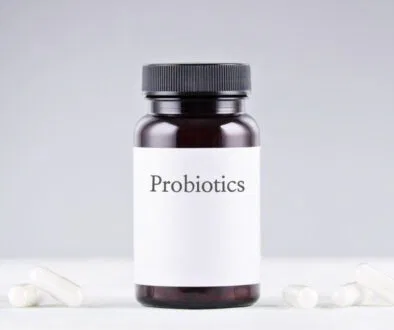Digestive Enzymes vs. Probiotics: What’s the Difference?

Published Aug 1, 2021
Digestive enzymes and probiotics are widely known for their health benefits. Both help in treating digestive health problems and boosting the immune system. But even though they have similar benefits and are commonly found in the gut, probiotics are different from digestive enzymes. That said, knowing the difference between enzymes and probiotics will help you determine which is more beneficial for you.
What are Digestive Enzymes?
Digestive enzymes are proteins found in our digestive tract – mouth, stomach, pancreas, and the small intestine. Their primary role is to help your body break down food and absorb nutrients. Without such, the nutrients in the food you eat will just go to waste. And without those nutrients, your body will have a hard time performing even the most basic functions.
There are three main types of digestive enzymes:
Amylase: breaks down starches and carbohydrates into sugars.
Protease: breaks down proteins into amino acids.
Lipase: breaks down lipids, which are fats and oils, into glycerol and fatty acids.
Aside from supplements, we also get digestive enzymes from the foods we eat such as:
- avocados
- mangoes
- fermented vegetables like sauerkraut and kimchi
- banana
- honey
Lack of digestive enzymes can result in indigestion, gas bloating, and compromised immune systems. One of the most common enzyme deficiencies is lactose intolerance. It happens when your body does not produce enough lactase to break down lactose from dairy products. People with enzyme deficiency usually need digestive enzyme supplements to avoid unwanted symptoms.
How Digestive Enzymes Work
Our body produces natural enzymes that aids in the digestion and absorption of nutrients. When you eat, these enzymes speed up chemical reactions that break down your food into substances that the digestive tract can absorb.
If you didn’t know, digestion starts from the moment you begin chewing your food. Your saliva contains amylase, a digestive enzyme that breaks down starches. When the food reaches your stomach, your pancreas will produce various enzymes to break it down into nutrients. The type of enzymes the pancreas sends to the stomach will depend on the types of food it needs to digest.
For instance, if you’re eating carbohydrate-rich foods, a digestive enzyme called amylase will turn it into sugar. And if you ate meat, an enzyme called pepsin will break it down into protein. While lipase, another digestive enzyme, takes care of fats and oils.
From the stomach, your food will travel down to the small intestine. There, another set of enzymes will break it down further. The sugar turns to simple sugars like glucose, the protein becomes amino acid, and fats are digested into fatty acids. At this stage, the body can now absorb them and release them into your bloodstream. From there, these nutrients are taken to the cells to help your body perform normal bodily functions. Glucose, for example, gives your cells the necessary energy they need. Protein, on the other hand, helps repair tissues and build muscles.
What Are Probiotics?
Probiotics are live microorganisms that are gaining popularity worldwide because of their touted health benefits. Commonly known as the “good bacteria”, they are primarily responsible for keeping a healthy balance in your microbiome – your body’s microbial population. This, in turn, keeps the bad bacteria from taking over thus preventing diseases.
These beneficial bacteria are widely known for treating gut issues such as intestinal spasms, diarrhea, and indigestion among others. But, unknown to many, probiotics can also treat ear, nasal, and mouth problems. It’s also proven to improve the immune system.
Like digestive enzymes, probiotics are naturally found in our body but they can also come from the foods we eat like:
- yogurt
- kimchi
- sauerkraut
- kefir
- kombucha
- pickles
Apart from foods, probiotic supplements are also a good source of good bacteria. Though, unlike foods, supplements are usually formulated with specific probiotic strains to address specific health issues. That’s why when you buy probiotic supplements, you’ll notice that there are different probiotics for oral health, gut health, skin health, etc.

How Probiotics Work
When we hear the word “bacteria”, we often associate it with dirt and illnesses. Thus, it’s something we should avoid at all cost. But unknown to many, your body is home to trillions of bacteria – both good and bad. Healthy people have a balanced population of both types of bacteria.
Unfortunately, certain factors like stress and dietary changes can cause an interruption in this balance. When this happens, the bad bacteria multiply exponentially and takes over the good ones. Think of it as like two countries fighting for territory. When one country has very few soldiers defending it, the enemy can just barge in and gain control. In this case, your body is the territory and the good and bad bacteria are the two opposing countries. When the bad bacteria triumphs, it can obviously lead to undesirable consequences.
This is where probiotics enter the picture. They help replenish your body’s population of good bacteria thus restoring balance to your microbiome. As mentioned, this balance keeps the bacteria at bay which, in turn, prevents illnesses and restores your overall health.
Digestive Enzymes vs. Probiotics
In a nutshell, the main difference between digestive enzymes and probiotics is their composition and function. Digestive enzymes are non-living proteins while probiotics are living microorganisms. The former helps the body digest foods and absorb nutrients to keep it functioning properly. While the latter helps the body function properly by keeping the bad bacteria in check.
Can You Take Probiotics and Digestive Enzymes Together?
Probiotics and digestive enzymes are essential to keep your body healthy. But since they play different roles and do different things, there’s nothing with taking enzymes and probiotics together.
Each has its own benefits, so you don’t necessarily have to choose which one is better. Taking both digestive enzymes and probiotics together promotes optimal digestion and boosts your body’s immune function.
Remember, however, that supplements affect different people in different ways. As such, it’s always a good idea to consult your doctor first before taking any type of supplement.
Benefit From The Latest Advancements In Probiotic Science With Bionaze
Bionaze is a proprietary blend of probiotics proven to promote ear, nose, and throat health, improve digestion, and support your immune system. The active ingredients BLIS K12, and BL-04 are considered among the best probiotics according to science.
Get 25% Off Your First Order when you use BIO25 at checkout!

This Content Has Been Reviewed For Factual Accuracy
This content has undergone thorough fact-checking by our team of internal experts. Learn more about the meticulous editorial standard for our website here.
ADVERTISEMENT

About The Author
Judy Ponio is a professional writer based in the Philippines. Her commitment to communicating factual content in when writing is unmatched. She works hard to cross check reputable sources to ensure her work uses accurate facts.




